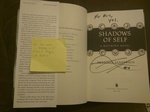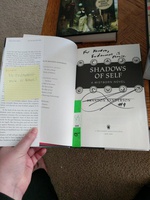Questioner
How does a bridge crew set a bridge down across a chasm in front of them?
Brandon Sanderson
So... I may have to act this out.
*Proceeds to act it out, no video available*
I am Kaladin, running at the front of the bridge, right? Now there's a chasm there. I'm going to step out to the side and grab the poles to the side, and lower the front bridge down. Then these guys are going to lower theirs down while I run around to the back and grab the poles on the side, which extend out. And we're going to get several ranks and then we're going to shove together.
We're waited on this side, remember, we've got the weights that roll to one side or the other. So it's weighted on this side, so we get it over and then plot it down. We're looking for a place where we're a little bit above-- with the paths, alright? And then we go to the other side, your reposition the weights or the poles or whatever it is on the thing so that it's heavier on this side and then get everyone and then you pull it back across and then you can lift it.
Questioner
Okay, great, thank you very much.
Brandon Sanderson
Now also keep in mind a couple of things: 0.7 Earth gravity, a very important aspect for actually making this bridge weight work for carrying it; and it is a soulcast wood. The only way to get the numbers to work if you've got engineers, the weight-- you actually have to realize that we've got a wood that is slightly stronger, yet lighter, than what-- it's like a-- Peter came up, it's like a balsa, there's a soulcast wood that is really a great wood for this sort of thing.
That doesn't mean it's light, it's still a really heavy book
Questioner
*Laughter*
Brandon Sanderson
A really heavy bridge.


